A ban universally praised for protecting the Antarctic continent and its seas may be enabling “scientific research” into this wilderness region’s hydrocarbon resources. Read Part One here.
Key points
- The annual meeting of the treaty’s fisheries commission has failed for a fifth year in a row to realise potential marine protected areas surveyed by Russia — and possibly other countries.
- Wide-ranging “scientific research” into oil and gas is enabled by the Antarctic mining ban, which can be changed from 2048.
- While commercial prospecting and extraction may be illegal, Antarctic Treaty nations seem unable to draw a clear line between science and mineral resource activities in the world’s last unmined frontier.
- Potential exploitation of Antarctic mineral resources appears to be hardwired into Russia’s current natural resources action plan.
First adopted in 1991 after a years-long battle of international negotiations, the Antarctic Treaty’s mining ban outlaws “any activity relating to mineral resources, other than scientific research”.
Yet, in “Part One: Battleground Antarctica”, we showed that Russia has conducted extensive summer oil and gas assessments in 24-hour broad daylight at least since the ban formally entered into force in 1998, and exposed the detailed expedition diaries of possible prospectors.
We also reported that a mammoth potential of 500 billion barrels in hydrocarbon “resources” (the building blocks for oil and gas) might be hidden in supergiant oil fields within the Southern Ocean’s marine sedimentary basins. These waters include several million square kilometres that were up for protection at a recent meeting of the treaty’s fisheries commission, although Russia and China — advocating “rational use” and scientific reasons — have previously declined such proposals since supporting the 2016 Ross Sea protected area.
At the end of October, those talks failed for a fifth year in a row.
In Part Two of this investigative series, we can report that while the so-called mining ban may have, in fact, been used to justify “scientific research” into oil, gas and other mineral resources in the sensitive Antarctic, commercial prospecting for hydrocarbon resources is widely considered to be illegal under that ban. We can also reveal that ongoing Antarctic hydrocarbon investigations — often weighted with the language of economic intent — appear to be hardwired into Russia’s current natural resources action plan, reports and long-term state strategies, while other countries may also be sizing up Antarctica’s mining potential across a range of raw materials.
That whiff of economic potential
Published just as the pandemic swept world headlines, the 500 billion-barrel bombshell statement was issued by geology crews aboard the Akademik Alexander Karpinsky from Cape Town, a strategic Antarctic transport gateway.
The 37-year-old Karpinsky, a polar research vessel, belongs to the Polar Marine Geosurvey Expedition (PMGE), a St Petersburg-based joint stock company claiming to be the Russian Federation’s only “specialised” outfit to perform “comprehensive geological and geophysical research” in the treaty’s area below 60°S latitude. PMGE also offers “services for studying the subsurface geology and searching for minerals … in the most difficult-to-reach regions of the Earth”.
Travelling annually via Cape Town to the Antarctic, the blue and white-hulled Karpinsky features a seismic system that includes an airgun array and a 640-channel, 8km marine cable with hydrophones, which appears to have decoded far more than Antarctica’s fascinating and important geological secrets.
It has also produced data heavily laced with conclusions about potential oil and gas reserves beneath the Southern Ocean, and ultimately mineral resources elsewhere in the Antarctic, as we show in both parts of this series.
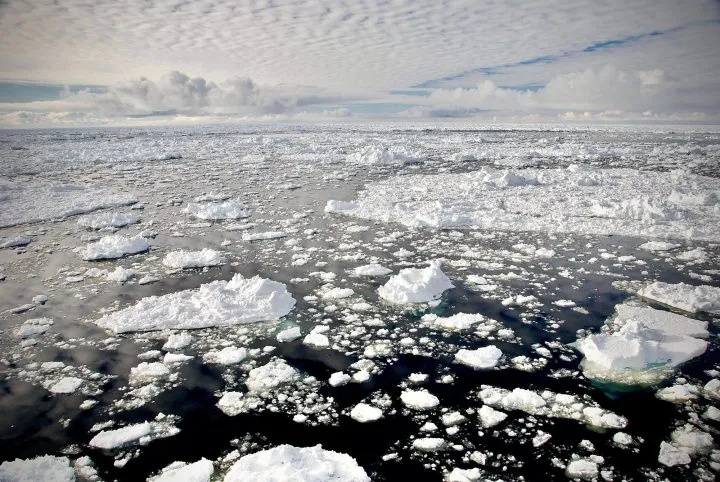 The Southern Ocean depths off East Antarctica may hold thick hydrocarbon deposits. (Photo: Tiara Walters)
The Southern Ocean depths off East Antarctica may hold thick hydrocarbon deposits. (Photo: Tiara Walters)
Exposing intent: ‘Extraction for humankind’
PMGE’s holding company, the Russian state explorer Rosgeo, released the February 2020 communiqué from Cape Town days after another event of global importance — on Thursday 6 February, Argentina’s Esperanza station would measure the highest temperature ever confirmed on Antarctica: 18.3°C.
As a region known for Earth’s coldest temperatures was shattering heat records, PMGE was searching its waters for the very hydrocarbons shown by scientists such as, indeed, leading Russian glaciologist Alexey Ekaykin to be speeding up the overall, long-term warming and retreat of the West Antarctic ice sheet.
And it is none other than Russia’s current 660-billion roubles ($9-billion) “Reproduction and Use of Natural Resources” programme that appears to have amplified the geological findings obtained in Antarctica by enshrining their commercial exploitation into official policy.
“The objectives are,” the programme’s 2014-24 policy document declares under a section marked “priority implementation”, “the reproduction of the mineral resource base on the basis of increasing the geological knowledge of the territory of the Russian Federation, its continental shelf, the Arctic, Antarctica and the World Ocean … ”
“Expected results of implementation” also appear to exceed the ban’s scientific allowances by obtaining “geological information to ensure the geopolitical interests of the Russian Federation in the Arctic, Antarctic and the World Ocean”.
The policy document was reviewed by us in its original Russian form, as well as other state documents and reports that indicate the apparent raison d’être behind Russia’s Antarctic mineral resource activities.
This trove of documents also features Russia’s new Antarctic strategy up to 2030, which outlines a plan to push ahead with mineral resource investigations. Released at the end June, the strategy’s action plan announced the “annual implementation of integrated field geological and geophysical work with the aim of studying the geological structure and minerals of Antarctica” on land, by air and in the surrounding seas. Among other state entities, it charges Rosgeo as well as the Arctic and Antarctic Scientific Research Institute, the state’s polar science arm, with carrying out these missions.
Additionally, infrastructure developments reveal the involvement of Russia’s hydrocarbon oligarchy.
Oligarch Leonid Mikhelson — chair of Russian natural gas giant Novatek — has reportedly personally sunk about 4-billion roubles into building a new research base at Vostok in East Antarctica’s so-called “Pole of Cold”.
Mikhelson has suggested that his interest in the project is purely philanthropic as the present ramshackle research station near the subglacial Lake Vostok has been swallowed by snow and ice. Unspecified private investors may also be involved, according to Russian media. The Russian government has announced its own contribution of 3,5-billion roubles in transport and installation costs towards the station modules, which sailed past Cape Town aboard cargo vessel Andrey Osipov in October.
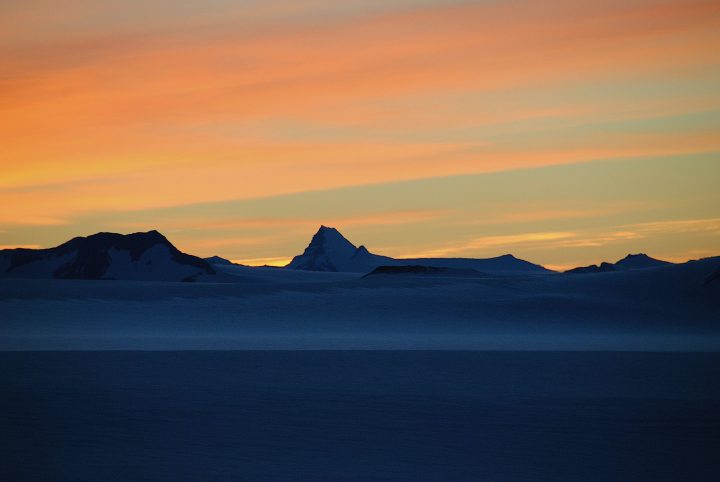 The midnight sun sets over the Ahlmannryggen range in the Norwegian-claimed territory of Queen Maud Land, East Antarctica. (Photo: Tiara Walters)
The midnight sun sets over the Ahlmannryggen range in the Norwegian-claimed territory of Queen Maud Land, East Antarctica. (Photo: Tiara Walters)
Russia’s admission that Antarctic geological and geophysical studies may serve to flush out potential raw commodities for possible extraction emerges in a 2015 PMGE expedition report.
“The purpose of the geological and geophysical work,” that report says of the 2015 expedition in particular, “was to ensure the geopolitical interests of Russia in the Antarctic in the form of systematic regional geological and geophysical studies of the subsoil of Antarctica and the adjacent continental shelf, which represent a potential reserve for the extraction of mineral raw materials by future generations of humankind”.
Russia’s Ministry of Natural Resources declined to comment, referring us instead to the foreign affairs ministry, who did not respond to our request for comment. The Arctic and Antarctic Research Institute, which manages diverse scientific disciplines under the Russian Antarctic Expedition, also did not respond to requests for comment.
However, replying to our request for substantive clarification of Rosgeo and PMGE’s geological and geophysical work, the exploration company told us in a detailed response that it was “in no way engaged in the exploration and exploitation of Antarctic mineral resources” — or any activity “going beyond the standard boundaries of non-commercial geology”.
The exploration company’s reply to Daily Maverick, produced on behalf of itself and PMGE, also notes the following:
- Other than carrying out Russian interests “to preserve Antarctica as a nature reserve intended for peace and science”, the purpose of Rosgeo and its PMGE subsidiary’s research is “exclusively scientific in nature” — that is, using geology and geophysics to understand the Antarctic’s origins, structure and marine sedimentary cover better.
- This is borne out by the Russian Federation’s Antarctic action plan up to 2030, which is interested only in the scientific assessment and forecast of the region’s mineral resources, says the exploration company.
- Judged only in the “most general” way, possible hydrocarbon distribution in Antarctic seas is not only a natural byproduct of such geological inquiry, but a necessity of scientific professionalism, it argues.
To afford Rosgeo and its subsidiary the right of full reply, we publish the complete statement here.
Rosgeo’s detailed response to our request for comment.
Lights, Cramra, action: who wants to be a bullionaire?
PMGE’s 50-year anniversary report, published 2012, applauds the subsidiary’s geologists for producing magnetic and gravitational-field maps spanning 4 million km2 — including 2,5 million km2 “for the exposed mountainous regions of coastal Antarctica”. Maps also cite potential resources such as gold, diamonds, copper-nickel, coal, iron ore and even uranium.
Just what, however, Antarctic Treaty language deems to be the breaking point between unfettered scientific research and mineral resource activities seems to be anyone’s guess. (See the next section, which lays out more of these difficulties.)
The treaty constitution contains zero legal definitions for “prospecting”, “exploration” and “mineral resource activities” — while the “peace” and “science” emblems that course through the lifeblood of treaty activities also lack definitions. Even the Madrid Protocol, often hailed as one of the most significant environmental agreements in this corner of the Milky Way, has failed to ringfence these concepts and draw unequivocal boundaries of what is permissible.
Even so, the very first article in the abandoned 1988 Antarctic mining pact — the Convention on the Regulation of Antarctic Mineral Resource Activities (Cramra) — yields explicit explanations of the most critical terms.
That abandoned mining pact, signed by 19 Antarctic Treaty states, was skewered when France and Australia pulled out over public protests. Or as Valery Lukin, veteran former head of the Russian Antarctic Programme suggests in a 2017 Madrid Protocol analysis, those two countries were merely impelled by an “unwillingness to enter into fierce technological competition with the most economically and scientifically developed countries”.
Cramra, spawned in the wake of the 1970s energy crisis, would make way for the definitive plot twist in the closed-body theatre of Antarctic politics — the 1991 adoption of none other than the mining ban, which would usurp the mining pact’s 1988 signing within a geopolitical hair’s breadth. The pact, therefore, is not legally enforceable — but it does shine a spotlight on how its 19 signatories, including Russia, found a way to thrash out the thorniest concepts during the fraught mining negotiations that preceded the ban.
- “Mineral resources”: This means “all non-living natural non-renewable resources, including fossil fuels, metallic and non-metallic minerals”.
- “Antarctic mineral resource activities”: This is “prospecting, exploration or development”. This type of activity, the pact’s language says, “does not include scientific research activities ...”
- “Prospecting”: “Activities, including logistic support, aimed at identifying areas of mineral resource potential for possible exploration and development.” It includes “geological, geochemical and geophysical investigations and field observations, the use of remote-sensing techniques and collection of surface, seafloor and sub-ice samples”.
Demonstrating the importance that Russia appears to attach to the mining pact, “Information Paper IP-014” tabled by Russia’s own officials at a 2002 Warsaw treaty meeting invokes this very pact to argue that prospecting cannot be classified as legal geological research in Antarctica — therefore drawing a distinction between the two activities.
And, if “mineral resource potential for possible exploration and development” indicates prospecting exactly in the way the mining pact envisaged it, it appears that PMGE’s intention to take part in potential Antarctic minerals extraction also emerges in the subsidiary’s 55th anniversary report, published 2017.
“The works of the PMGE aimed at studying the geological structure and mineral resources of the Antarctic are of geopolitical nature. They ensure guarantees of Russia’s full participation in any form of possible future development of the Antarctic mineral resources — from designing the mechanisms for regulating such activities up to their direct implementation,” the subsidiary reveals.
Antarctic Treaty commercial mining activities have, in fact, been prohibited for more than four decades — the ban was adopted in 1991, and only formally entered into force in 1998, but it was in “Recommendation IX-1 of 1977” that the majority of treaty countries, including Russia and China, agreed “to refrain from all exploration and exploitation of Antarctic mineral resources”.
“As a result of these works,” the 55th anniversary report reveals, “the Russian Federation receives information on the mineragenic potential of the Antarctic continent and on the prospects of the oil and gas potential of the seas awashing it.”
Legally combing Antarctica for its mineral resources
All this might sound puzzling while world leaders are now in Scotland for a landmark global climate crisis meeting. In October, Russian President Vladimir Putin also announced his country’s own new net-zero plans by 2060. However, the Madrid Protocol’s ban “does not prohibit research activity into oil and gas”, stresses Donald Rothwell, an Australian National University law professor.
The ban, or the protocol’s “Article Seven” as it is formally known, “must be read against the ‘freedom of scientific investigation’ principle”, he says.
Rothwell is a prominent authority on polar law. In order to “accord with the interests of science and the progress of all mankind”, as the constitution puts it, the treaty was designed by the original drafters who bestowed upon science a kind of deific status today playing out in the steady march of Antarctic realpolitik.
Here, scientific research may have to involve useful and important investigations into potentially dangerous methane reservoirs beneath Antarctica — even as surveys of oil, gas, gold, diamonds and iron and other mineral resources may be getting a free ride under this ban, which spans just 13 words.
This would explain why Russia — a vocal defender of both the treaty and its mechanisms, as well as an implementer of a litany of domestic laws on Antarctica — may feel legally justified under treaty laws to publish commercially weighted findings that appear “promising for oil and gas”.
 The full wording of the 'Article Seven' mining ban, as outlined in the Madrid Protocol. (Image: Madrid Protocol screenshot)
The full wording of the 'Article Seven' mining ban, as outlined in the Madrid Protocol. (Image: Madrid Protocol screenshot)
Still, that raises questions about whether such work is acceptable in a climate-threatened region facing historic existential risk. In fact, our series of interviews with veteran Antarctic academics such as Rothwell confirms that commercial prospecting for mineral resources would be widely considered in breach of the ban.
Therefore, the flouting of treaty rules through commercial prospecting would, in theory, impose a duty on some of Earth’s most influential powers — including the US, the UK and Germany — to draw a line in the ice and act against such activities. These countries rank among just 29 voting states worldwide who have gained that elite status by committing to the expensive scientific research exacted by Antarctica’s demanding working environments.
They also rank among a mere 42 out of a total of 54 treaty member states who have bothered to ratify the Madrid Protocol and, thus, the mining ban.
In other words, those countries who have not signed the protocol — such as some 150 UN member states not party to Antarctic agreements — are largely only bound to the ban insofar as they wish not to upset the big-league trolls under the bridge leading to Antarctica’s mooted natural resources.
These resources might range from whales to minuscule crustacea called krill — an indispensable link in the Southern Ocean food chain — to that jealously guarded, putative pantry of mineral wealth itself.
‘Sidestepped for fear of creating significant controversy’
The final version of “Information Paper IP-014” — Russia’s 2002 defence of the country’s “scientific research” into mineral resources — notes that the ban’s wording is “so simple and straightforward [that it cannot] afford any misinterpretation”.
While the earlier, more descriptive draft can be viewed in Part One, we publish the final version here:
Warsaw Official Geological ... by DocumentsZA
'Information Paper IP-014', tabled by Russia at a 2002 Warsaw treaty meeting.
The ban “contains no limitation whatsoever with regard to scientific research associated with mineral resource expectations in Antarctica”, Information Paper IP-014 continues, “thus demonstrating a full compliance with the freedom of scientific research provided by the Antarctic Treaty”.
And therein looms the elephant seal in the room, contends the University of Canterbury’s Alan Hemmings — the ban’s “brevity makes it both very clear and not clear at all”.
A professor in Antarctic governance, Hemmings was commander of the British Antarctic Station during the 1982 Falklands war, and emphasises that “‘peace’ and ‘science’ are worthy aspirational goals claimed as purposes without ever being defined by the treaty. That leaves one hostage to interpretation. It is sadly possible to drive a snowcat through Article Seven — if you so wish — and essentially leave your critics to demonstrate that it is more than scientific research, and technically a breach.”
Elizabeth Buchanan, a polar geopolitics specialist at Australia’s Deakin University, and fellow of the Modern War Institute at West Point, says that “this is the issue with the treaty — worded in a broad sense; and that is problematic because all international law/agreements are about interpretation. One state’s conception of peace is not the same as another’s. Some states interpret this to be environmentally geared and protectionist — others apply more weight to principles of science, endeavour and exploration.”
“All states party to the treaty,” Buchanan remarks, “have the potential to weaponise science for national interest.” Japan’s currently halted “scientific” whale hunts in the Southern Ocean are a particularly controversial example of this kind of laissez-faire interpretation.
The line between scientific research and prospecting is particularly difficult to resolve, Rothwell says.
“It’s the critical policy, political, diplomatic and legal issue — it has been sidestepped for fear of creating significant controversy because of the way the treaty system operates,” the polar law expert chuckles in muted exasperation during a virtual interview. “One of the crucibles of treaty decision-making is consensus. So, unless you get consensus among the treaty parties, you cannot move forward.”
Such concerns, suggests Hemmings, may speak to the subtle tyrannies of the undefined within the Antarctic Treaty System, the full framework that oversees a host of agreements relating to the region’s management.
“You just ‘lawyer’ your way through them if they represent inconvenient obstacles,” he says.
The treaty’s Committee for Environmental Protection did not respond to our request for comment. The Scientific Committee on Antarctic Research (SCAR) — an independent but influential advisory body to the treaty — declined to comment on how science may be “weaponised” under the treaty’s “freedom of scientific investigation” principle.
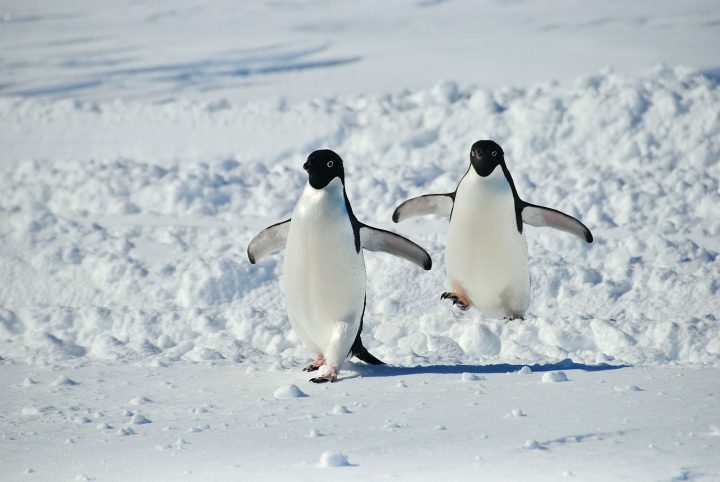 Adélie penguins rushing over Southern Ocean sea ice off East Antarctica. (Photo: Tiara Walters)
Adélie penguins rushing over Southern Ocean sea ice off East Antarctica. (Photo: Tiara Walters)
‘Whistling Dixie’
Devoting the entire Antarctic Treaty area below 60°S to the noble ideals of peace and science are benchmark victories on a conflict-torn planet under the unforgiving whip of the Anthropocene. These ideals were espoused by the Madrid Protocol’s own 30th anniversary celebrations in Spain in October.
Yet, still lacking six decades since 12 countries first signed the treaty, is a ratified liability annex on responding to environmental emergencies in the Antarctic — which, admirably, Russia approved back in 2013 already. Meanwhile, vocal marine park champions France and the US — plus several other treaty nations — had yet to do so by June this year.
The Antarctic is hardly without politics, but the treaty’s “dispute clause” has never been invoked.
“Much of the research that underpins the future of our entire planet comes out of the Antarctic. And yet we are totally incapable of having a discussion around the table at treaty meetings about these things,” Hemmings says.
“We are riven by the emerging new polarity between the Chinese and the West. We keep saying, ‘Yes, we are all committed to the protection of the ‘Antarctic environment and its dependent and associated ecosystems’; we all reaffirm our commitment to Article Seven … blah, blah, blah.”
The treaty’s recently launched Paris Declaration — which renews support for the mining ban as well as the UN’s global Paris climate agreement — is all very well, but it has not added anything new, Hemmings says.
“It has no legal power,” the Antarctic governance expert notes of the Paris Declaration, and other new declarations like it. “It has not agreed that we would not mine Antarctica in perpetuity, or even made any formal decisions to throw out the prohibition for another 50 years.”
The Paris Declaration, Hemmings argues, is “‘whistling Dixie’ — it’s like you’re out on the prairie, surrounded by wolves or people with guns and all you can do is keep your spirits up and whistle to yourself”.
Albert Lluberas, executive secretary for the Antarctic Treaty Secretariat, declined our request for comment on Russia’s activities and broader treaty challenges, noting that the secretariat did “not provide comments on situations or actions as it is not in our mandate”.
According to the treaty secretariat’s website, to which Lluberas himself referred us, the secretariat’s mandate includes “ensuring that all activities in Antarctica are consistent with the purposes and principles of the Antarctic Treaty and its [Madrid] Protocol on Environmental Protection”.
Read our full request for comment to the treaty secretariat:
At Secretariat Comment Request by DocumentsZA
As raised by polar specialists, we brought several issues of concern to the treaty secretariat, who declined to comment.
‘Questions’ about other states
China, a treaty member since 1983 and a Madrid Protocol signatory, has been flagged for Antarctic minerals exploration “potentially in breach of international law”, writes the New Zealand polar academic Anne-Marie Brady in a 2017 co-authored study. Having raised four stations since the mid-1980s, with a fifth now being built, the People’s Republic has placed the Antarctic on its Polar Silk Road as part of the gargantuan Belt and Road Initiative.
Leading up to the prohibitions, most founding treaty signatories were, in fact, associated with mineral resource research — including Japan, Norway, apartheid South Africa, the US and, indeed, the Soviet Union.
Data from such investigations is freely available under the treaty, as German Leitchenkov, polar geology professor at St Petersburg State University, told Daily Maverick. “Our data collected in Antarctica are freely available for everybody and can be used by any scientist,” he points out, but freely exchanged data does not necessarily guarantee Antarctica immunity against potentially extractive commercial interests.
“There are questions around whether other — including Western — states might be laundering their ‘prospecting’ through ‘scientific research’; or more devious routes such as advanced modelling outside the Antarctic Treaty area,” Hemmings adds — but Russia, “as far as the accusations and evidence in the public domain are concerned, is seemingly in a class of its own”.
PMGE may believe that the Russian crews deserve praise, too.
In an October 2016 report, the subsidiary gives them unadorned credit for the “overwhelming majority” of work required to identify Antarctica’s potential supergiant oil fields.
“Vast sedimentary basins were discovered with predicted hydrocarbon resources estimated at 70 billion tons of standard fuel,” this report notes.
“The overwhelming majority of these works were carried out from the R/V Akademik Alexander Karpinsky.”
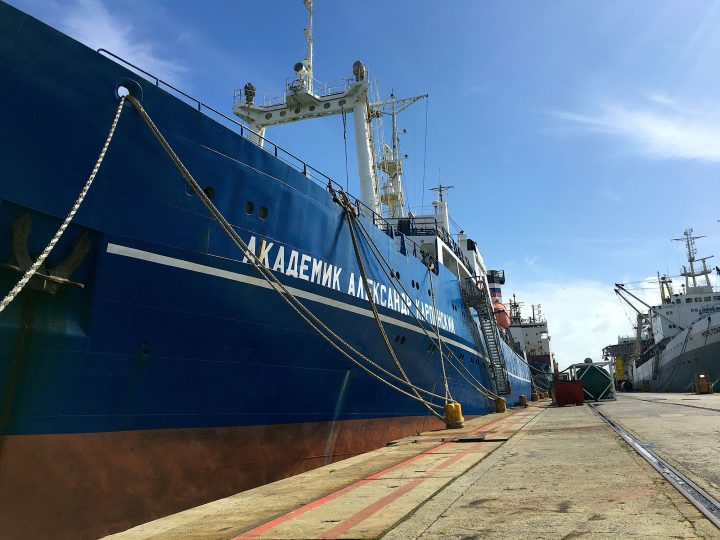 The 37-year-old research vessel in Table Bay harbour, August 2020. (Photo: Tiara Walters)
The 37-year-old research vessel in Table Bay harbour, August 2020. (Photo: Tiara Walters)
Wielding claims of new data that would “substantially” clarify the Southern Ocean’s hydrocarbon prospects, Rosgeo’s 2020 communiqué appears to foreshadow a portent emphasised by not only 2010 but also 2012 state sources. These also mention that 500 billion barrel estimate — or “potential hydrocarbon resources of approximately 70 billion tons”.
Since typing up these figures, the Karpinsky has completed at least a decade of annual hydrocarbon surveys. If these estimates have been refined, we have been unable to ascertain from Russian state agencies if they have been made public.
Amid a growing vacuum of US credibility as the West’s only superpower, however, Russia may now have a long-term head start if ever the midnight sun sets on the Antarctic as the world’s last unmined frontier.
‘Coming home to roost’: the battleground heats up
Contrary to what is loosely known among treaty commentators as the “expiry myth”, the ban — technically speaking — does not have an end date, but it can be reviewed from 2048 should just one treaty country with voting powers call for such a review.
Steven Chown, a leading conservation biologist from South Africa and SCAR’s immediate past president, told us that “requirements for change” to the ban “are so onerous that nobody expects much change to happen”.
And polar law expert Donald Rothwell argues that the Madrid Protocol’s environmental principles would be a tough opponent to defeat in the event of legal conflict with country rights under, for instance, the 1982 Law of the Sea Convention, the UN rule book for oceans and resources.
If mining activities such as prospecting could be ruled out, however, there would be no need for a ban.
“The issue is not neutralised by any means,” Rothwell says.
Turning his attention to the Arctic at the opposite end of the Earth, Rothwell points out that all major Arctic states, such as Russia through its PMGE subsidiary, are engaged in Far North offshore oil and gas activities.
“All those issues playing out in front of us in the Arctic,” he argues, “must — subject to challenges like technology and available markets — come home to roost in the Southern Ocean.”
Seabed mining may be ‘imminent’
“There is no legal vacuum in the Antarctic,” Rothwell advises, but it does not appear as if everyone enjoys clarity on just how to frame the ban against offshore activities.
A treaty signatory with voting powers, the Netherlands in its newly gazetted 2021-2025 polar strategy issues a caveat that appears to show just how vulnerable the Southern Ocean may be to would-be energy interests.
“It is not clear whether the ban applies to offshore activities [in Antarctica],” the strategy concedes, but the Netherlands is still of the “view that the ban on minerals extraction for non-scientific purposes applies both onshore and offshore”.
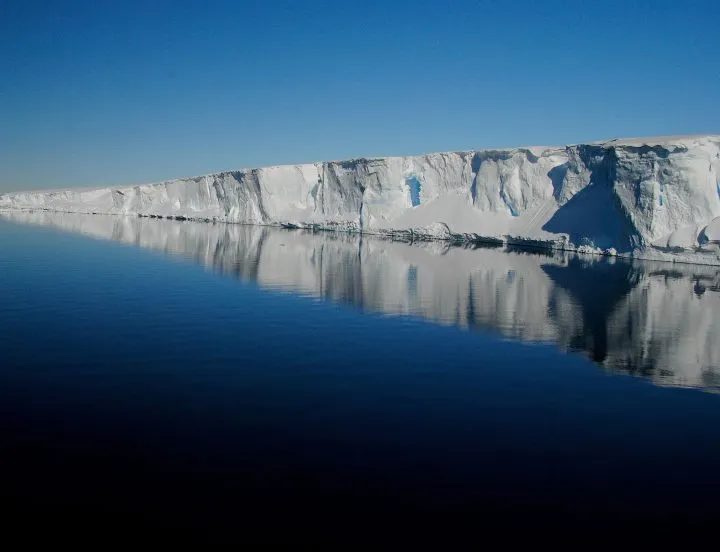 Abutting the edge of the ice shelf, these sensitive waters off continental East Antarctica represent Earth’s last unmined frontier. (Photo: Tiara Walters)
Abutting the edge of the ice shelf, these sensitive waters off continental East Antarctica represent Earth’s last unmined frontier. (Photo: Tiara Walters)
The Netherlands’ view may be just as well for environmental protectionists — because the UN’s International Seabed Authority has the remit to issue exploration licences for Southern Ocean mining, Rothwell says.
Here, international maritime lawyer Duncan Currie warns that the nascent industry of “seabed mining” may be “imminent”.
Representing the Deep Sea Conservation Coalition, Currie as well as others are calling for a moratorium on seabed mining amid plans by the island nation of Nauru to mine a zone of the North Pacific for polymetallic nodules in less than two years.
In response to Rosgeo’s communiqué, Currie told Daily Maverick: “If one country is down there doing this, you have to wonder when other countries will think, ‘Well, we do not want to be left behind.’”
Don’t get Madrid, get even
Although the International Energy Agency’s most optimistic net-zero pathway by mid-century for embodied-carbon products like plastics is still pegged at around 24 million barrels of oil per day, it is the global transition to cleaner energy, high recovery costs and available markets that are often cited as factors to render Antarctic mining fears obsolete.
For one, “oil prices would need to be above $150 per barrel consistently”, suggests Elizabeth Buchanan, the Australian polar geopolitics specialist — but, as a burgeoning new international energy crisis with rising fuel costs shows, the best-laid plans of ice and men often go awry: for instance, “many oil-poor states regard Antarctica’s potential mineral resources as part of the solution to their medium-term energy needs” writes Anne-Marie Brady, the New Zealand polar academic, in a 2019 discussion paper for the Australian Civil-Military Centre.
As for oil and gas-flush Russia, Buchanan argues that extraction of Antarctic hydrocarbons may not be its major concern.
Russia’s hydrocarbon investigations, Buchanan says, largely revolve around strategic competition and “crafting a strong narrative for Russian Great Power” so redolent in announcements such as the communiqué, released to coincide with Russia’s so-called 200-year discovery of Antarctica.
Buchanan suggests that “exploiting the system from within is much easier — and permissible”; or the country may “gain in future posturing by knowing where the resources are, and waiting at the sidelines for other states to disrupt the status quo.
“With a Madrid Protocol imploded or fractured, it is ready and waiting to act,” she notes.
“The motivation, if you are an autocracy, is a decadal vision, rather than having to worry about bumbling your way through the next election cycle.”
Like the US, Russia has no frozen territorial claims in the Antarctic. Both countries have simply reserved the right to assert a claim to part or all of a continent that ultimately connects to every major world ocean.
“It is more about blocking market competition should another state tap these oil reserves and become an energy competitor on the global stage. Particularly if these reserves then target Russia’s Indo-Pacific energy export market,” Buchanan adds. “Competition in locking up resources is as much about locking up the market shares, too.”
Access through the ice, via a warming climate and new technology, paired with “potential market demand for resources, will of course change the logic again. And Moscow and Beijing are certainly getting ready for that day”. DM/OBP
[hearken id="daily-maverick/8821"]




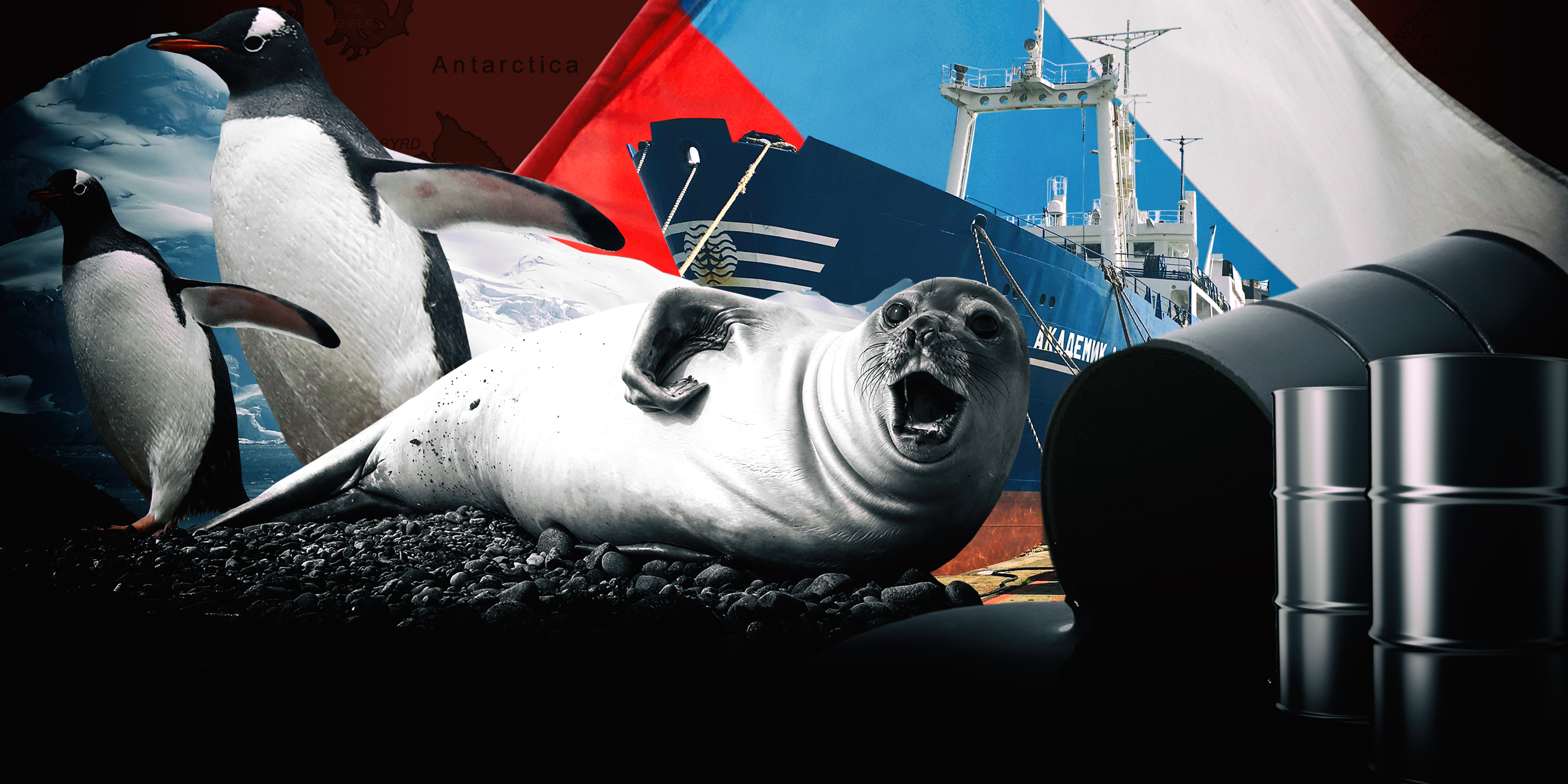 Abutting the edge of the ice shelf, these sensitive waters off continental East Antarctica represent Earth’s last unmined frontier. (Photo: Tiara Walters)
Abutting the edge of the ice shelf, these sensitive waters off continental East Antarctica represent Earth’s last unmined frontier. (Photo: Tiara Walters)